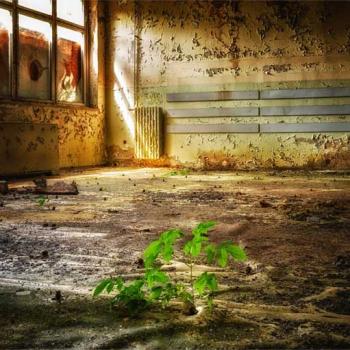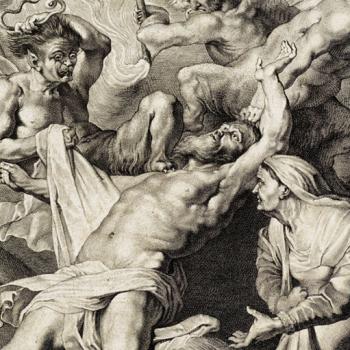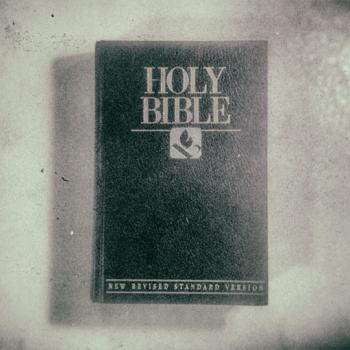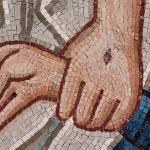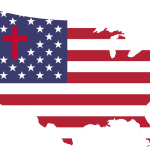
What did Jesus mean when he said to Pilate, “My kingdom is not from/of this world” and how does this relate to the way Christians should love their country?
Certainly Jesus did not mean that God’s kingdom is heavenly while the kingdom represented by Pilate is earthly. I suppose one could try to make a case for that interpretation based on readings in John’s Gospel, but it would stand in opposition to its meaning in the Synoptics. The kingdom envisioned in the model prayer is about God’s will being done on earth as it is in heaven.
Also, Jesus is certainly not suggesting that Pilate’s kingdom is a political kingdom while God’s kingdom is a spiritual kingdom. That is an impossible distinction to make because all governments, businesses, economic systems, politics, and institutions of all types express some kind of spirituality. In some cases (perhaps many) the spirituality exhibited may be a demonic kind of spirituality that is oppressive and destructive, but it is a spirituality nonetheless. All systems and structures in society reflect some kind of spirituality.
So what is Jesus saying? In John’s Gospel the term “world” is used both positively and negatively. When employed positively it refers to God’s good creation, with particular emphasis on the world of humanity. When used negatively is refers to what the late Walter Wink described as the domination system, a system that is pervaded by greed, selfish ambition, and egocentric pride (see 1 John 2:15-17).
Jesus says to Pilate, “If my kingdom were from/of this world (that is, if it was part of the domination system, if it partook of greed, selfish ambition, and egocentric pride), then my followers would be fighting to keep me from being handed over to those in power.”
Why would they be fighting? Because violence is a characteristic mark of the domination system in contrast to nonviolence and the pursuit of peace that are characteristic marks of God’s kingdom.
This is why it is a dangerous thing to comingle allegiance to God with allegiance to country that often occurs in patriotic worship services. Worshipers tend to equate or conflate the two.
I’m not suggesting that Christians should stay out of politics. On the contrary, I think Christians should be right in the thick of it. Our Christianity, however, should inform our politics, not the other way around. No political party can claim God is on their side. God does not side with political parties. God sides with whoever will take up the plight of the poor, oppressed, disenfranchised, and most vulnerable.
If Jesus were to tell the story of the good Samaritan to Christians in contemporary America he would tell it as the good Muslim. I have a notion that if many Christians stopped trying to Christianize the domination system they might begin to actually grasp what Jesus was about and why the domination system put him to death.
So when Jesus says that the kingdom he represents is not from/of this world he is talking about an alternative to the domination system. We probably shouldn’t call it a kingdom at all, because our understanding of kingdom tends to be shaped by the domination systems we are part of and participate in.
I love the term that Cynthia Langston Kirk coins in her poem, “Kin_dom without walls.”
Imagine a place
Where mercy resides,
Love forms each heart,
Compassion lived out with grit and determination.
A place where lavish signs
Mark each path barrier free.Imagine a place
Where skin tones are celebrated
Like the hues of tulips in springtime.
Where languages inspire
With symphonies of diversity.
Where Respect schools us
In custom and history
And every conversation
Begins with a bow of reverence.Imagine a place where each person wears glasses,
Clarity of vision for all.
Recognizing each one, everything
Made in the image of God.Imagine a place
Where carrots and pasta
Doctor’s skills and medications
Are not chained behind barbed wire-
Food, shelter, health care available for all.Imagine a place where
Every key of oppression
Was melted down to form public art
Huge fish, doves, lions and lambs
On which children could play.Imagine a place where
People no longer kept watch
Through the front window
To determine whether the welcome mat
Would remain on the porch.Such is the work
The journey
They destination
In the kin_dom of God.
(Living the Questions, p. 163)
Jesus tells Pilate that those who listen to his voice belong to the truth (John 18:37). Pilate then asks cynically, “What is truth?” Cynical or not it is a good question.
In John’s Gospel, truth is relational and incarnational, not propositional or doctrinal. Truth is what pervades God’s kin_dom where redemptive relationships are central. God’s kin_dom is about compassion, forgiveness, inclusion, belonging, healing, nonviolence, peacemaking, and redemption; the exact opposite of the greed, selfish ambition, egocentric pride, prejudice, vengeance, and violence that mark the domination systems of this world. Such is the truth of God.
I love the way the late William Sloan Coffin talks about how our faith should inform our love of country. He asks, “How do you love America?” He says, “Don’t say, ‘My country, right or wrong.’ That’s like saying, ‘My grandmother, drunk or sober’; it doesn’t get you anywhere. Don’t just salute the flag, and don’t burn it either. Wash it. Make it clean.” (Credo, p. 93)
How should we love America? As Christians we should allow the alternative reality and vision of a world healed, liberated, and made right inform how we relate to our country – the way we vote, the causes we champion, the issues we care about, and the way we go about caring for each other and our planet.
Our calling as the church, as disciples of Jesus, is to be the body of Christ in the midst of the domination system. Our calling is to shine the light of the grace and truth of God’s kin_dom wherever we can – in the voting booth, in the marketplace, on the ball field or golf course, at the office, in the classroom, at a political rally, at the soup kitchen or women’s shelter, at a habitat project, when visiting a friend, fixing a meal, disciplining a child, engaging in conversation, and on and on the list goes.
Can our kin_dom lives, relationships, and communities offer an alternative to the domination systems of the world?
 Chuck Queen is a Baptist minister and the author of Being a Progressive Christian (is not) for Dummies (nor for know-it-alls): An Evolution of Faith. Chuck blogs at A Fresh Perspective, and is also a contributor to the blog Faith Forward and Baptist News Global.
Chuck Queen is a Baptist minister and the author of Being a Progressive Christian (is not) for Dummies (nor for know-it-alls): An Evolution of Faith. Chuck blogs at A Fresh Perspective, and is also a contributor to the blog Faith Forward and Baptist News Global.







